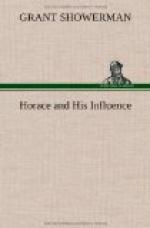But these trifles light as air are nevertheless of the sort for which mankind is eternally grateful, because men are convinced, without process of reason, that by them the fibre of life is rested and refined and strengthened. We may call this familiar effect by the less familiar name of re-creative. What lover of Horace has not felt his inmost being cleansed and refreshed by the simple and exquisite art of The Bandusian Spring, whose cameo of sixty-eight Latin words in four stanzas is an unapproachable model of vividness, elegance, purity, and restraint:
O_ crystal-bright Bandusian Spring_,
W_orthy thou of the mellow
wine_
A_nd flowers I give to thy pure depths_:
A_ kid the morrow shall be
thine_.
T_he day of lustful strife draws on_,
T_he starting horn begins
to gleam_;
I_n vain! His red blood soon shall
tinge_
T_he waters of thy clear,
cold stream_.
T_he dog-star’s fiercely blazing
hour_
N_e’er with its heat
doth change thy pool_;
T_o wandering flock and ploughworn steer_
T_hou givest waters fresh
and cool_.
T_hee, too, ’mong storied founts
I’ll place_,
S_inging the oak that slants
the steep_,
A_bove the hollowed home of rock_
F_rom which thy prattling
streamlets leap_.
Or who does not live more abundant life at reading the Chloe Ode, with its breath of the mountain air and its sense of the brooding forest solitude, and its exquisite suggestion of timid and charming girlhood?
“Y_ou shun me, Chloe, wild and shy_
A_s some stray fawn that seeks
its mother_
T_hrough trackless woods. If spring-winds
sigh_,
I_t vainly strives its fears
to smother_;—
“I_ts trembling knees assail each
other_
W_hen lizards stir the bramble
dry_;—
Y_ou shun me, Chloe, wild
and shy_
A_s some stray fawn that seeks its mother_.
“A_nd yet no Libyan lion I_,—
N_o ravening thing to rend
another_;
L_ay by your tears, your tremors by_,—
A_ husband’s better
than a brother_;
N_or shun me, Chloe, wild and shy_
A_s some stray fawn that seeks
its mother_.”
But there are those who demand of poetry a usefulness more easily measurable than that of recreation. In their opinion, it is improvement rather than pleasure which is the end of art, or at least improvement as well as pleasure. In this, indeed, the poet himself is inclined to agree: “He who mingles the useful with the pleasant by delighting and likewise improving the reader, will get every vote.”
Let us look for these more concrete results, and see how Horace the person still lives in the character of men, as well as Horace the poet in the character of literature.




